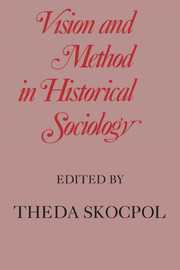Book contents
- Frontmatter
- Contents
- Preface
- 1 Sociology's Historical Imagination
- 2 The Social and Historical Landscape of Marc Bloch
- 3 Beyond the Economistic Fallacy: The Holistic Social Science of Karl Polanyi
- 4 Configurations in History: The Historical Sociology of S. N. Eisenstadt
- 5 Theoretical Generalization and Historical Particularity in the Comparative Sociology of Reinhard Bendix
- 6 Destined Pathways: The Historical Sociology of Perry Anderson
- 7 E. P. Thompson: Understanding the Process of History
- 8 Charles Tilly's Collective Action
- 9 The World System of Immanuel Wallerstein: Sociology and Politics as History
- 10 Discovering Facts and Values: The Historical Sociology of Barrington Moore
- 11 Emerging Agendas and Recurrent Strategies in Historical Sociology
- An Annotated Bibliography on Methods of Comparative and Historical Sociology
- Notes on the Contributors
2 - The Social and Historical Landscape of Marc Bloch
Published online by Cambridge University Press: 05 June 2012
- Frontmatter
- Contents
- Preface
- 1 Sociology's Historical Imagination
- 2 The Social and Historical Landscape of Marc Bloch
- 3 Beyond the Economistic Fallacy: The Holistic Social Science of Karl Polanyi
- 4 Configurations in History: The Historical Sociology of S. N. Eisenstadt
- 5 Theoretical Generalization and Historical Particularity in the Comparative Sociology of Reinhard Bendix
- 6 Destined Pathways: The Historical Sociology of Perry Anderson
- 7 E. P. Thompson: Understanding the Process of History
- 8 Charles Tilly's Collective Action
- 9 The World System of Immanuel Wallerstein: Sociology and Politics as History
- 10 Discovering Facts and Values: The Historical Sociology of Barrington Moore
- 11 Emerging Agendas and Recurrent Strategies in Historical Sociology
- An Annotated Bibliography on Methods of Comparative and Historical Sociology
- Notes on the Contributors
Summary
In the 1970s the work of the French Annales school (so named after their journal, Annales: Economies, Sociétiés, Civilisations) finally achieved a well-deserved fame in American social science. It is not that it was previously obscure, but it had only been the knowledgeable specialists of European history who had appreciated it. The growth of historical work in sociology has greatly increased the prestige of the Annalistes, and Immanuel Wallerstein has even gone so far as to name his research establishment at the State University of New York the Fernand Braudel Center. Braudel has been the reigning senior member of the Annales since the death of Lucien Febvre, whose student he was.
The fame of Braudel and Emmanuel Le Roy Ladurie, the heir apparent, has spread far beyond the academies, and their works are translated as high-priced trade books for a general intellectual audience. In France, they are best-sellers.
The movement, for that is what the Annales group became, was begun by Lucien Febvre and Marc Bloch in the 1920s, when they both taught at the University of Strasbourg. Even more than Febvre, Bloch's two decades of unsurpassed scholarship and publication established the intellectual foundations and fame of the Annales.
Forty years before it became fashionable to combine history, sociology, anthropology, and economics, Marc Bloch was doing it. His work, and that of his direct followers, has been so influential that Bloch might be considered one of the fathers of contemporary historical sociology.
- Type
- Chapter
- Information
- Vision and Method in Historical Sociology , pp. 22 - 46Publisher: Cambridge University PressPrint publication year: 1984
- 5
- Cited by

